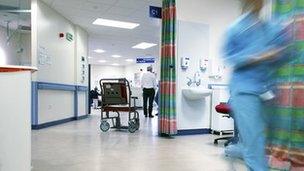Q&A: The CQC
- Published

Hospitals are among the services inspected
The Care Quality Commission, regulator of health and care services in England, has come under intense scrutiny this week after allegations that former managers were involved in "covering up" a report into the deaths of babies at a hospital in Cumbria.
The organisation was set up in 2009.
So what was it charged to do, and how has it fared?
What is the CQC?
The commission took over the work of three previous regulators: the Healthcare Commission, which inspected the NHS as well as private and voluntary healthcare providers; the Commission for Social Care Inspection; and the Mental Health Act Commission.
That means it has responsibility for ensuring hospitals, care homes, dentists, GPs and care homes are safe and that they offer high-quality compassionate care.
Health and social care providers also have to register with the organisation to operate.
It has an annual budget of around £160m.
It employs around 2,100 staff, around half of whom are front-line inspectors and assessors.
What does it do?
It can go in unannounced to carry out an investigation, or after concerns are raised about poor care.
However, much of its system relies on self-assessment by trusts - a political decision.
The CQC carried out 15,408 inspections in 2009-10 and 7,271 in 2010-11.
There were 18,858 inspections in 2011-12, a figure the regulator is set to significantly exceed this year.
Inspection teams are made up of people from these different backgrounds: some from the health and social care service, others from the police or fire service who have experience of carrying out inspections.
How has it fared?
There have been difficulties.
At the outset, the CQC had to introduce new monitoring systems and it also found it hard to recruit enough staff.
A series of reports from the Commons Select Health Committee and the National Audit Office in 2010 and 2011 highlighted problems including too much focus on registering providers rather than inspecting them.
A new management team, led by the current chief executive David Behan, came in last summer.
Health Secretary Jeremy Hunt has said he has confidence in the current team.
What happened at Furness General Hospital?
Concerns first came to light in 2008 after the deaths of a number of babies and mothers in the hospital's maternity unit.
But it was given a clean bill of health by the CQC at its next inspection in 2010.
The following year, police began an inquiry into a number of deaths. Also in 2011, the CQC commissioned an internal review of its investigation of the hospital.
What are the allegations against the CQC?
A whistle-blower raised concerns with senior CQC managers in March last year about the organisation's regulation of the Cumbrian trust.
Mr Behan ordered external consultants Grant Thornton to investigate.
It found the 2011 internal CQC report was not made public because it was decided it was too critical.
Grant Thompson highlighted a meeting of senior managers in March last year at which that decision is said to have taken place.
Its report said this "might well have constituted a deliberate cover-up", though the allegations have been denied.
The CQC initially refused to name those at the meeting because of data protection concerns.
However, it came under pressure to put the names in the public domain, and finally did so on Thursday.
The CQC revealed that the people present were Cynthia Bower, then CQC chief executive, her deputy Jill Finney, Anna Jefferson, head of press, and Louise Dineley, CQC head of regulatory risk and quality, who had written the report.
Ms Bower and Ms Jefferson have denied being involved in a cover-up.
Ms Finney has had her employment terminated at her new job, chief commercial officer at Nominet, which controls the .co.uk web domain. She has not commented.
The current bosses of the CQC are set to be questioned by MPs on the Commons health committee.
Are things going to change?
Mr Hunt has said he has faith in the new team at the head of the CQC,
He has also announced there will be chief inspectors of hospitals, GPs and social care.
Mr Hunt has also said he wants NHS inspection to be more like Ofsted, which investigates schools.
There have similar budgets, while the CQC has more staff.
Health think-tank the Nuffield Trust recently said Ofsted-style inspections were a good idea.
But hospitals are typically much bigger and more complex organisations which carry out a wider array of tasks than schools.
The Nuffield Trust said to make such a system work the CQC would need extra resources, political support and time to develop it.
- Published19 June 2013
- Published20 June 2013
- Published19 June 2013